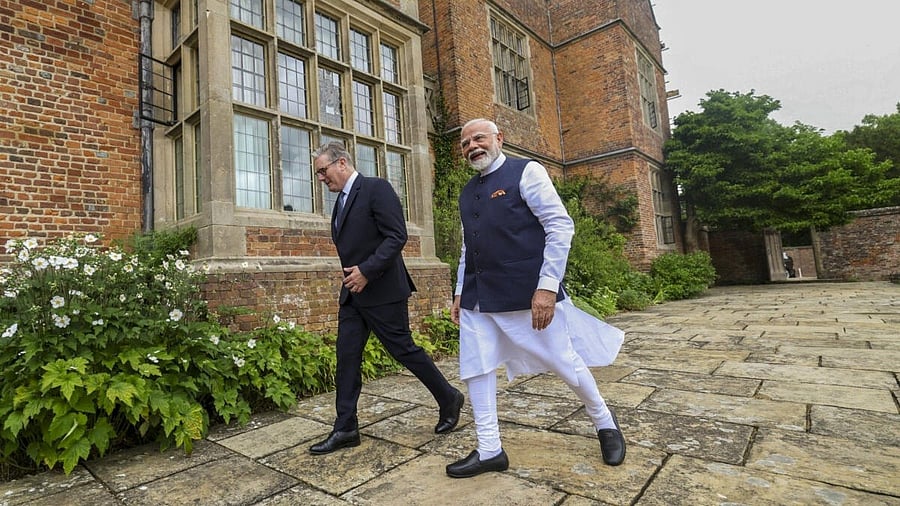
In this image posted by @narendramodi via X on July 24, 2025, Prime Minister Narendra Modi with his British counterpart Keir Starmer during a meeting at Chequers Estate, in UK.
Credit: PTI Photo
New Delhi: India and the United Kingdom on Thursday agreed on a 10-year-long roadmap for defence industrial collaboration, apart from inking a Memorandum of Understanding for cooperation between the premier probe agencies of the two nations to combat corruption, economic offences, serious fraud and organised crimes.
As the Central Bureau of Investigation of India and the National Crime Agency of Britain inked the MoU to step up bilateral cooperation, Prime Minister Narendra Modi nudged his counterpart, Keir Starmer, to help New Delhi bring to justice the fugitive economic offenders, like Vijay Mallya, Nirav Modi and Lalit Modi, by extraditing them from the UK.
Modi and Starmer not only witnessed the formal signing of the India-UK Comprehensive Economic and Trade Agreement (CETA), which they had announced during a phone call on May 6, but also unveiled the ‘Vision 2035’ for the bilateral partnership over the next decade.
The India-UK CETA is expected to help double the annual bilateral trade from the current level of nearly $56 billion. The two sides also agreed on the Double Contribution Convention, which will exempt the professionals from India working in the UK and their employers from social security payments for up to three years. Besides, the Indian and British governments reaffirmed their commitment to working towards the early conclusion of a Bilateral Investment Treaty.
The two sides agreed to promote strategic and defence industry collaboration through the adoption of a 10-year roadmap as well as to deepen collaboration in advanced technologies and complex weapons, supporting innovation and co-development, through cooperation programs, such as the Electric Propulsion Capability Partnership and Jet Engine Advanced Core Technologies.
Modi and Starmer also agreed to encourage the opening of international branch campuses of leading UK universities and institutions in India and on transnational education partnerships for delivering joint and dual degree courses in critical subject areas, boosting the future economies of both countries.
The trade agreement between India and the United Kingdom is “not only an economic partnership deal, but also a blueprint for shared prosperity”, Modi said as he and Starmer met in London on Thursday. Starmer said that the CETA with India was the “biggest and economically most significant trade deal” the UK had made since leaving the European Union in January 2020.
“On the one hand, it paves the way for enhanced market access in the UK for Indian textiles, footwear, gems and jewellery, seafood, and engineering goods. It will also unlock new opportunities for India’s agricultural produce and processed food industry,” Modi said as he and Starmer addressed the media persons. “Above all, this agreement will be especially beneficial for India’s youth, farmers, fishermen, and the MSME sector.”
“On the other hand,” the prime minister added, “the products made in the UK, such as medical devices and aerospace components, will become more accessible and affordable for Indian consumers and industries.”
“Our landmark trade deal with India is a major win for Britain. It will create thousands of British jobs across the UK, unlock new opportunities for businesses and drive growth in every corner of the country, delivering on our Plan for Change,” said the prime minister.
